Italy beat England in the final, but they're not the only teams who left their mark on the tournament—for better and worse.
Europe has a new champion after Italy was coronated at Wembley Stadium on Sunday in a tense Euro 2020 final decided by penalty kicks. It put a cap on a memorable month that spanned the continent and featured a number of memorable moments, classic and dramatic matches and one life-threatening experience that, thankfully, became part of the feel-good story of the tournament.
We witnessed an astounding number of own goals—11 to be exact, or more than twice the number scored by co-leading scorers Cristiano Ronaldo and Patrik Schick—more than half of the knockout matches taken to extra time and one of the most entertaining days in the history of the international game. At the end of that day, the overwhelming favorite and reigning World Cup champion was bounced in the round of 16, sparking a subset of questions that will carry on until the 2022 World Cup in Qatar.
With this competition concluded, though, it's time to look back and rank all 24 teams on how they performed according to the expectations they had at the beginning of the tournament—starting in reverse order:
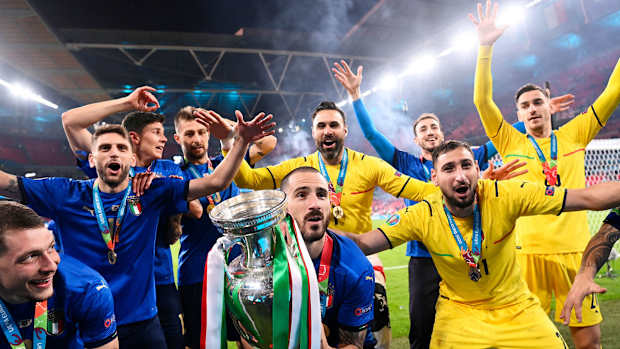
24. TURKEY
Turkey came to Euro 2020 widely tipped as a dark horse. It had a pair of solid central defenders in Merih Demiral and Çağlar Söyüncü, a goalscorer in Burak Yílmaz coming off the back of a fine season and a fleet of gifted midfielders. But the expectation of a progressive approach proved misplaced. Turkey was timid and tentative against Italy and deservedly beaten 3-0, then never got going against either Wales or Switzerland. Three defeats and a goal difference of -7 was just one goal off the worst performance by any side in European Championship history.
23. RUSSIA
Russia did beat Finland, but after the success of the 2018 World Cup, when it reached the quarterfinals on home soil, and given it played two games in St. Petersburg, a group-stage exit was a significant underachievement. Stanislav Cherchesov’s side was slow and plodding, and all the hoped-for evolution did was to suggest just why Sergei Ignashevich, the Berezutskis and Igor Akinfeev had hung on for so long. Cherchesov was ultimately fired after Russia's elimination.
22. SLOVAKIA
Slovakia did win a game, it’s true. And maybe nobody expected much of it anyway. But still: that 5-0 defeat to Spain was one of the most abject performances ever seen at a major championship. The win against Poland was fortuitous and probably wouldn’t have happened if not for Grzegorz Krychowiak’s foolish red card, while the lack of ambition against Sweden ultimately proved costly. But the tactical plan, sitting deep with two deep-lying center forwards and nobody to run in behind them, never made much sense.
21. POLAND
There was an odd sense in which this tournament was not as bad for Poland as a record of one draw and two defeats may suggest. Losing Krzysztof Piątek and Arkadiusz Milik before the competition was a major blow to Poland's attack, but after a shaky start against Slovakia, it was well on top when Krychowiak was sent off. The Poles played well in drawing with Spain and then caused Sweden major problems in the final half hour. Performances were better than results, but, still, to have a forward as good as Robert Lewandowski and still go out in the group stage is a big disappointment.
20. SCOTLAND
All that pride and all that emotion, and in the end all Scotland had to show for itself was a goalless draw against England at Wembley. To an extent, just qualifying for the Euros after a 23-year absence was an achievement, and Scotland didn’t play badly. But it missed chances against the Czech Republic and was undone by a fine header and then an astonishing goal from just outside the center circle. After having held England, the Scots just didn’t have the quality to beat Croatia.
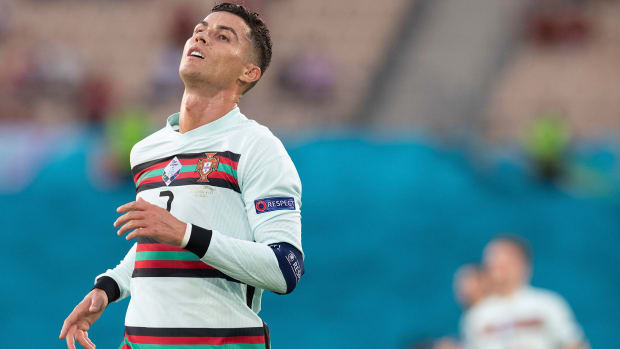
19. PORTUGAL
The most recent European champion and the reigning UEFA Nations League champion didn’t play well in a single game. It was held for 84 minutes by Hungary before taking the lead with a deflected shot that followed a deflected pass and adding two further goals that added a very flattering gloss to the scoreline. It was ripped apart by Germany’s wingbacks, and the defensive solidity that had defined its play under Fernando Santos was still absent as it drew against France, squeaking through as a top-four third-place team for the second straight Euros. Defeat to Belgium in a brutal last-16 game was not a surprise for a talented squad still weirdly reliant on the 36-year-old Ronaldo, who set more personal records in what could have been his last Euros.
18. FRANCE
The problem when you’ve won the World Cup by playing within yourself is that it’s very hard to be sure when you’re playing badly. Through the group stage, the thought was that this was just France being France, doing just enough while coming nowhere near playing to the apparent potential of the squad. It turned out it was just playing poorly. Having held Germany at arm’s length, it struggled to break Hungary down and was scratchy against Portugal. Defeat to Switzerland on penalties in the last 16 was a desperate story of tactical inelegance and then arrogance on either side of a tantalizing half hour in which it played brilliantly.
17. GERMANY
That Germany is not lower in this list is largely a reflection of how limited expectations were. Other than the Portugal game, when Joshua Kimmich and Robin Gosens were rampant, Germany was dismal. It was extremely fortunate to scramble through the group with a late equalizer against Hungary, and it never truly threatened a nervy England in the last 16. Manager Joachim Löw probably should have left his role after the last World Cup. This is a far more gifted generation of players than it is showing to be.
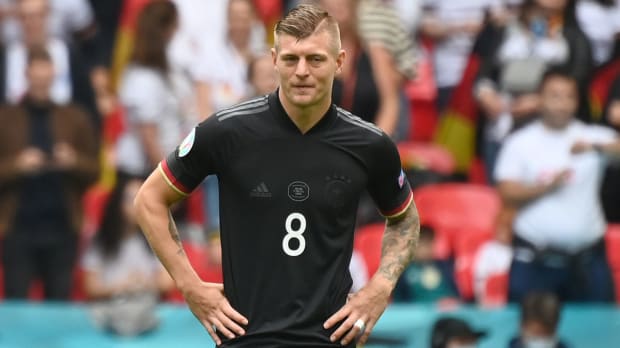
16. NORTH MACEDONIA
North Macedonia lost every game, but that doesn’t tell the full story. As a first qualifier through the Nations League League D path, its performances were a mini-triumph. This was abundant vindication for the idea of elevating an in-form minnow rather than a plodding middle-rank nation. It had its great moment—Goran Pandev’s goal against Austria—and caused problems in all three games by playing on the front foot, and the tournament experience should be beneficial in the long term.
15. FINLAND
Finland was neat, well-organized and a little toothless, just as would have been expected, but its tournament was shaped by the events of the opening game and Christian Eriksen’s collapse. Its win that day, which should have been a euphoric moment, was naturally overclouded by concern for Eriksen. Finland’s fans were exemplary, with the call and response of “Christian” and “Eriksen” an extraordinarily moving moment. Its tournament was effectively ended by the defeat to Russia.
14. NETHERLANDS
This is not an exceptional squad, but the draw was relatively kind, and the Dutch, playing at home in Amsterdam, won all three of its group games. The thought then was perhaps that the problems under Frank De Boer had been overstated. But defeat to the Czech Republic made clear just how deep they ran. The red card for Matthijs De Ligt perhaps offers some mitigation, but the Dutch implosion at that point suggested a team lacking belief or tactical intelligence, and defeat ultimately cost De Boer his job.

13. CROATIA
When Croatia finally woke up at halftime of its second game, it turned out it still was very good. Four players had retired after the World Cup final in 2018, and many of those who remained were showing signs of age. But when it cut loose, as it did against Scotland and then in desperation in Spain, it proved that Croatia can compete. And but for a stunning save from Unai Simón early in extra time in that last-16 game, Croatia might have made the quarterfinals.
12. WALES
Wales had few expectations. Nobody was seriously anticipating a repeat of 2016 when it reached the semifinal, particularly with its manager, Ryan Giggs, suspended as he faces domestic abuse charges. But Wales battled hard against Switzerland to get a point and then deservedly beat Turkey. Defeat to a much-changed Italy in the final group game was a return to reality, and Denmark outplayed it almost from start to finish in winning 4-0 in the last 16.
11. BELGIUM
For the golden generation, this feels like the end. Belgium was unfortunate that Kevin De Bruyne and Eden Hazard were never fully fit, but even if they had been, it’s hard to imagine that they could have compensated for an aging defense. Belgium was imperious at times—in the second half against Denmark in the group stage most notably—but the decision to protect that back three against Portugal by sitting deep, while probably the correct one, made that game a battle, and early Italian goals made that approach impossible in the quarterfinals.
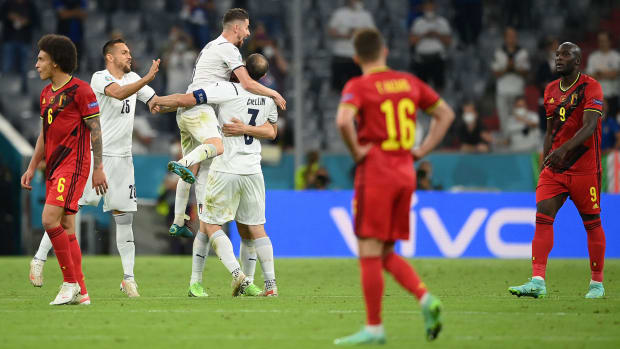
10. HUNGARY
The draw was desperately unkind for Hungary, whose improvement goes on. Even with home advantage in its first two games, getting any points from a group including France, Portugal and Germany would have been regarded as an achievement. It very nearly held Portugal and then did frustrate France, before twice taking the lead against Germany. It wasn’t just that Hungary, playing without injured star Dominik Szoboszlai, was well-organized. The front pair of Roland Sallai and Ádám Szalai caused a constant threat.
9. SWEDEN
For Sweden, it was a slightly baffling tournament. It did superbly to thwart Spain with only 15% possession, did just enough to beat Slovakia and then just about clung on against Poland to top the group. It was solid, in its classic 4-4-2, enlivened by Emil Forsberg on the left of midfield and Alexander Isak at center forward. Perhaps it would have reached the quarterfinal but for Marcus Danielson’s unfortunate red card in extra time against Ukraine. With both sides exhausted, it was Ukraine who grabbed a last-minute winner that left nobody any the wiser about whether Sweden was actually any good.
8. UKRAINE
For much of the tournament, Ukraine was a disappointment. It flickered in patches against the Dutch, ended up under surprising pressure against North Macedonia and then struggled badly against Austria. Getting through as a best third-place team felt like a fluke. But the switch to a back three brought a last-minute victory over Sweden in the last 16 and that, alone, meant Ukraine had its moment to celebrate. Having lost every game at the Euros five years ago without scoring a goal, this was significant progress, and Ukraine played in a far more expansive style as well.
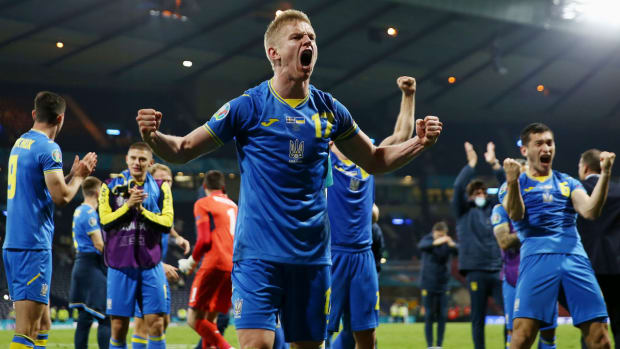
7. CZECH REPUBLIC
The change from March 2019, when the Czech Republic lost 5-0 to England at Wembley, has been remarkable. This is a Czech side that uses its resources well, is a constant threat from set plays and dangerous through its attacking wingbacks. Schick's effort from the halfway line against Scotland was perhaps the goal of the tournament. The victory over the Netherlands in the last 16 was aided by a red card, but it was thoroughly deserved. Jaroslav Šilhavý has made his side a fine example of a modern pressing side, and although it went through in third place in the group after defeat to England in the third game, its qualification in truth was never in doubt.
6. SPAIN
What to make of Spain? As it had been in the buildup to the tournament, it was good in parts. In terms of maintaining possession, there was no side in the tournament to touch it. But it struggled to turn that into clear chances, and to turn chances into goals—despite Luis Enrique’s attempts to give his side greater verticality. The group game against Sweden was almost farcical as Spain had 85% of the possession but couldn’t win. But Spain demolished a supine Slovakia, showed great character—if a dodgy central defense—against Croatia, and then just about held its nerve more than Switzerland in the quarterfinals. For long spells against Italy in the semis, it dominated, and could have won. Pedri, awarded the best young player in the tournament, was a breakout star. There is, at least, a sense that it is building.
5. AUSTRIA
Austria came into the tournament with almost no expectations and, in Franco Foda, a coach who was far from popular and had a reputation for tedium. Yet it played bright, proactive football to come second in its group, thoroughly deserving its victory over Ukraine. The use of David Alaba as a roving left back in that final group game and in the last 16 game against Italy gave Austria extra angles, and that caused Roberto Mancini’s side enough problems that Austria arguably deserved to win the game in normal time before Federico Chiesa’s extra-time strike sent Italy on its way.
4. SWITZERLAND
But for a meltdown in the quarterfinal penalty shootout against Spain, it could easily have been Switzerland facing Italy in the semifinal. It had been well-beaten by Italy in the group stage, but it opened up in a victory over Turkey in the final group game, and then played superbly against France, dominating the first half and then mounting an extraordinary comeback from 3-1 down in the final 10 minutes in the round of 16. It was having the better of the game against Spain as well until the harsh dismissal of Remo Freuler in the second half.
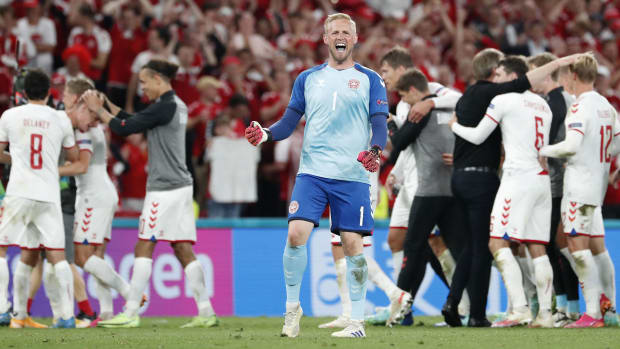
3. DENMARK
Events on the first Saturday of the tournament defined this Euros for Denmark, as Eriksen collapsed on the pitch after suffering cardiac arrest. That perhaps forged a sense of common purpose between the Denmark squad and fans, and Denmark rode a wave of emotion to the semifinals. To be able to do that, though, it had to be an exceptional team. The back three was solid, and Mikkel Damsgaard offered width and dribbling ability from the left. When Yussuf Poulsen was injured, Kasper Dolberg stepped in admirably. By extra time in the semifinal against England, Denmark looked exhausted, but it had already gone far further than could realistically have been expected.
2. ENGLAND
In the end, old failings did for England: the tendency to drop deep and the inability to score penalties. But given how atrocious England’s record in the Euros has been, just getting to the final represented a major achievement. It may have ended in defeat, but this was England’s best performance ever in a European Championship. Gareth Southgate’s side benefited from the way the bracket fell and the fact that structure of the tournament meant some other sides had vast distances to travel, while it had a home crowd in six of the seven games. That will only add to the sense of disappointment, but it won three knockout games in the tournament, something it has only ever done once before—in winning the 1966 World Cup—and it eliminated old nemesis Germany along the way.
1. ITALY
Italy came into the Euros on the back of a long unbeaten run, but still nobody quite trusted it because that series of games included no wins against any side in the top 15 of the FIFA rankings. Even as it romped through the group stage, playing the positive, proactive football Roberto Mancini has sought to instill since taking charge after the failure to qualify for the World Cup for the first time in 60 years, that doubt remained. But the unbeaten run remains and now stands at 34 games—one shy of the all-time record—and it has been punctuated with triumphs against Belgium, Spain and England. Italy was the best team in the tournament and a worthy champion.
More Euro 2020 Coverage:
- Wilson: How Italy Crashed England's Homecoming Party
- England PK Strategy Backfires in Euro 2020 Final
- Donnarumma Etches Name in Italy Lore With Euro Heroics
Italy beat England in the final, but they're not the only teams who left their mark on the tournament—for better and worse.
Europe has a new champion after Italy was coronated at Wembley Stadium on Sunday in a tense Euro 2020 final decided by penalty kicks. It put a cap on a memorable month that spanned the continent and featured a number of memorable moments, classic and dramatic matches and one life-threatening experience that, thankfully, became part of the feel-good story of the tournament.
We witnessed an astounding number of own goals—11 to be exact, or more than twice the number scored by co-leading scorers Cristiano Ronaldo and Patrik Schick—more than half of the knockout matches taken to extra time and one of the most entertaining days in the history of the international game. At the end of that day, the overwhelming favorite and reigning World Cup champion was bounced in the round of 16, sparking a subset of questions that will carry on until the 2022 World Cup in Qatar.
With this competition concluded, though, it's time to look back and rank all 24 teams on how they performed according to the expectations they had at the beginning of the tournament—starting in reverse order:

24. TURKEY
Turkey came to Euro 2020 widely tipped as a dark horse. It had a pair of solid central defenders in Merih Demiral and Çağlar Söyüncü, a goalscorer in Burak Yílmaz coming off the back of a fine season and a fleet of gifted midfielders. But the expectation of a progressive approach proved misplaced. Turkey was timid and tentative against Italy and deservedly beaten 3-0, then never got going against either Wales or Switzerland. Three defeats and a goal difference of -7 was just one goal off the worst performance by any side in European Championship history.
23. RUSSIA
Russia did beat Finland, but after the success of the 2018 World Cup, when it reached the quarterfinals on home soil, and given it played two games in St. Petersburg, a group-stage exit was a significant underachievement. Stanislav Cherchesov’s side was slow and plodding, and all the hoped-for evolution did was to suggest just why Sergei Ignashevich, the Berezutskis and Igor Akinfeev had hung on for so long. Cherchesov was ultimately fired after Russia's elimination.
22. SLOVAKIA
Slovakia did win a game, it’s true. And maybe nobody expected much of it anyway. But still: that 5-0 defeat to Spain was one of the most abject performances ever seen at a major championship. The win against Poland was fortuitous and probably wouldn’t have happened if not for Grzegorz Krychowiak’s foolish red card, while the lack of ambition against Sweden ultimately proved costly. But the tactical plan, sitting deep with two deep-lying center forwards and nobody to run in behind them, never made much sense.
21. POLAND
There was an odd sense in which this tournament was not as bad for Poland as a record of one draw and two defeats may suggest. Losing Krzysztof Piątek and Arkadiusz Milik before the competition was a major blow to Poland's attack, but after a shaky start against Slovakia, it was well on top when Krychowiak was sent off. The Poles played well in drawing with Spain and then caused Sweden major problems in the final half hour. Performances were better than results, but, still, to have a forward as good as Robert Lewandowski and still go out in the group stage is a big disappointment.
20. SCOTLAND
All that pride and all that emotion, and in the end all Scotland had to show for itself was a goalless draw against England at Wembley. To an extent, just qualifying for the Euros after a 23-year absence was an achievement, and Scotland didn’t play badly. But it missed chances against the Czech Republic and was undone by a fine header and then an astonishing goal from just outside the center circle. After having held England, the Scots just didn’t have the quality to beat Croatia.

19. PORTUGAL
The most recent European champion and the reigning UEFA Nations League champion didn’t play well in a single game. It was held for 84 minutes by Hungary before taking the lead with a deflected shot that followed a deflected pass and adding two further goals that added a very flattering gloss to the scoreline. It was ripped apart by Germany’s wingbacks, and the defensive solidity that had defined its play under Fernando Santos was still absent as it drew against France, squeaking through as a top-four third-place team for the second straight Euros. Defeat to Belgium in a brutal last-16 game was not a surprise for a talented squad still weirdly reliant on the 36-year-old Ronaldo, who set more personal records in what could have been his last Euros.
18. FRANCE
The problem when you’ve won the World Cup by playing within yourself is that it’s very hard to be sure when you’re playing badly. Through the group stage, the thought was that this was just France being France, doing just enough while coming nowhere near playing to the apparent potential of the squad. It turned out it was just playing poorly. Having held Germany at arm’s length, it struggled to break Hungary down and was scratchy against Portugal. Defeat to Switzerland on penalties in the last 16 was a desperate story of tactical inelegance and then arrogance on either side of a tantalizing half hour in which it played brilliantly.
17. GERMANY
That Germany is not lower in this list is largely a reflection of how limited expectations were. Other than the Portugal game, when Joshua Kimmich and Robin Gosens were rampant, Germany was dismal. It was extremely fortunate to scramble through the group with a late equalizer against Hungary, and it never truly threatened a nervy England in the last 16. Manager Joachim Löw probably should have left his role after the last World Cup. This is a far more gifted generation of players than it is showing to be.

16. NORTH MACEDONIA
North Macedonia lost every game, but that doesn’t tell the full story. As a first qualifier through the Nations League League D path, its performances were a mini-triumph. This was abundant vindication for the idea of elevating an in-form minnow rather than a plodding middle-rank nation. It had its great moment—Goran Pandev’s goal against Austria—and caused problems in all three games by playing on the front foot, and the tournament experience should be beneficial in the long term.
15. FINLAND
Finland was neat, well-organized and a little toothless, just as would have been expected, but its tournament was shaped by the events of the opening game and Christian Eriksen’s collapse. Its win that day, which should have been a euphoric moment, was naturally overclouded by concern for Eriksen. Finland’s fans were exemplary, with the call and response of “Christian” and “Eriksen” an extraordinarily moving moment. Its tournament was effectively ended by the defeat to Russia.
14. NETHERLANDS
This is not an exceptional squad, but the draw was relatively kind, and the Dutch, playing at home in Amsterdam, won all three of its group games. The thought then was perhaps that the problems under Frank De Boer had been overstated. But defeat to the Czech Republic made clear just how deep they ran. The red card for Matthijs De Ligt perhaps offers some mitigation, but the Dutch implosion at that point suggested a team lacking belief or tactical intelligence, and defeat ultimately cost De Boer his job.

13. CROATIA
When Croatia finally woke up at halftime of its second game, it turned out it still was very good. Four players had retired after the World Cup final in 2018, and many of those who remained were showing signs of age. But when it cut loose, as it did against Scotland and then in desperation in Spain, it proved that Croatia can compete. And but for a stunning save from Unai Simón early in extra time in that last-16 game, Croatia might have made the quarterfinals.
12. WALES
Wales had few expectations. Nobody was seriously anticipating a repeat of 2016 when it reached the semifinal, particularly with its manager, Ryan Giggs, suspended as he faces domestic abuse charges. But Wales battled hard against Switzerland to get a point and then deservedly beat Turkey. Defeat to a much-changed Italy in the final group game was a return to reality, and Denmark outplayed it almost from start to finish in winning 4-0 in the last 16.
11. BELGIUM
For the golden generation, this feels like the end. Belgium was unfortunate that Kevin De Bruyne and Eden Hazard were never fully fit, but even if they had been, it’s hard to imagine that they could have compensated for an aging defense. Belgium was imperious at times—in the second half against Denmark in the group stage most notably—but the decision to protect that back three against Portugal by sitting deep, while probably the correct one, made that game a battle, and early Italian goals made that approach impossible in the quarterfinals.

10. HUNGARY
The draw was desperately unkind for Hungary, whose improvement goes on. Even with home advantage in its first two games, getting any points from a group including France, Portugal and Germany would have been regarded as an achievement. It very nearly held Portugal and then did frustrate France, before twice taking the lead against Germany. It wasn’t just that Hungary, playing without injured star Dominik Szoboszlai, was well-organized. The front pair of Roland Sallai and Ádám Szalai caused a constant threat.
9. SWEDEN
For Sweden, it was a slightly baffling tournament. It did superbly to thwart Spain with only 15% possession, did just enough to beat Slovakia and then just about clung on against Poland to top the group. It was solid, in its classic 4-4-2, enlivened by Emil Forsberg on the left of midfield and Alexander Isak at center forward. Perhaps it would have reached the quarterfinal but for Marcus Danielson’s unfortunate red card in extra time against Ukraine. With both sides exhausted, it was Ukraine who grabbed a last-minute winner that left nobody any the wiser about whether Sweden was actually any good.
8. UKRAINE
For much of the tournament, Ukraine was a disappointment. It flickered in patches against the Dutch, ended up under surprising pressure against North Macedonia and then struggled badly against Austria. Getting through as a best third-place team felt like a fluke. But the switch to a back three brought a last-minute victory over Sweden in the last 16 and that, alone, meant Ukraine had its moment to celebrate. Having lost every game at the Euros five years ago without scoring a goal, this was significant progress, and Ukraine played in a far more expansive style as well.

7. CZECH REPUBLIC
The change from March 2019, when the Czech Republic lost 5-0 to England at Wembley, has been remarkable. This is a Czech side that uses its resources well, is a constant threat from set plays and dangerous through its attacking wingbacks. Schick's effort from the halfway line against Scotland was perhaps the goal of the tournament. The victory over the Netherlands in the last 16 was aided by a red card, but it was thoroughly deserved. Jaroslav Šilhavý has made his side a fine example of a modern pressing side, and although it went through in third place in the group after defeat to England in the third game, its qualification in truth was never in doubt.
6. SPAIN
What to make of Spain? As it had been in the buildup to the tournament, it was good in parts. In terms of maintaining possession, there was no side in the tournament to touch it. But it struggled to turn that into clear chances, and to turn chances into goals—despite Luis Enrique’s attempts to give his side greater verticality. The group game against Sweden was almost farcical as Spain had 85% of the possession but couldn’t win. But Spain demolished a supine Slovakia, showed great character—if a dodgy central defense—against Croatia, and then just about held its nerve more than Switzerland in the quarterfinals. For long spells against Italy in the semis, it dominated, and could have won. Pedri, awarded the best young player in the tournament, was a breakout star. There is, at least, a sense that it is building.
5. AUSTRIA
Austria came into the tournament with almost no expectations and, in Franco Foda, a coach who was far from popular and had a reputation for tedium. Yet it played bright, proactive football to come second in its group, thoroughly deserving its victory over Ukraine. The use of David Alaba as a roving left back in that final group game and in the last 16 game against Italy gave Austria extra angles, and that caused Roberto Mancini’s side enough problems that Austria arguably deserved to win the game in normal time before Federico Chiesa’s extra-time strike sent Italy on its way.
4. SWITZERLAND
But for a meltdown in the quarterfinal penalty shootout against Spain, it could easily have been Switzerland facing Italy in the semifinal. It had been well-beaten by Italy in the group stage, but it opened up in a victory over Turkey in the final group game, and then played superbly against France, dominating the first half and then mounting an extraordinary comeback from 3-1 down in the final 10 minutes in the round of 16. It was having the better of the game against Spain as well until the harsh dismissal of Remo Freuler in the second half.

3. DENMARK
Events on the first Saturday of the tournament defined this Euros for Denmark, as Eriksen collapsed on the pitch after suffering cardiac arrest. That perhaps forged a sense of common purpose between the Denmark squad and fans, and Denmark rode a wave of emotion to the semifinals. To be able to do that, though, it had to be an exceptional team. The back three was solid, and Mikkel Damsgaard offered width and dribbling ability from the left. When Yussuf Poulsen was injured, Kasper Dolberg stepped in admirably. By extra time in the semifinal against England, Denmark looked exhausted, but it had already gone far further than could realistically have been expected.
2. ENGLAND
In the end, old failings did for England: the tendency to drop deep and the inability to score penalties. But given how atrocious England’s record in the Euros has been, just getting to the final represented a major achievement. It may have ended in defeat, but this was England’s best performance ever in a European Championship. Gareth Southgate’s side benefited from the way the bracket fell and the fact that structure of the tournament meant some other sides had vast distances to travel, while it had a home crowd in six of the seven games. That will only add to the sense of disappointment, but it won three knockout games in the tournament, something it has only ever done once before—in winning the 1966 World Cup—and it eliminated old nemesis Germany along the way.
1. ITALY
Italy came into the Euros on the back of a long unbeaten run, but still nobody quite trusted it because that series of games included no wins against any side in the top 15 of the FIFA rankings. Even as it romped through the group stage, playing the positive, proactive football Roberto Mancini has sought to instill since taking charge after the failure to qualify for the World Cup for the first time in 60 years, that doubt remained. But the unbeaten run remains and now stands at 34 games—one shy of the all-time record—and it has been punctuated with triumphs against Belgium, Spain and England. Italy was the best team in the tournament and a worthy champion.
More Euro 2020 Coverage:


0 Comments